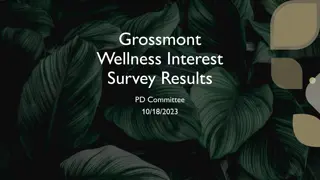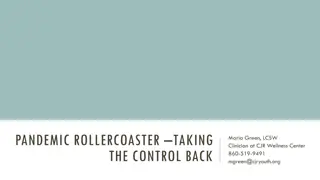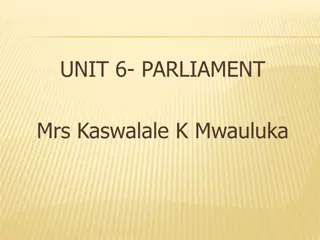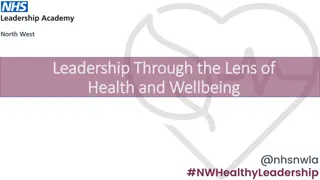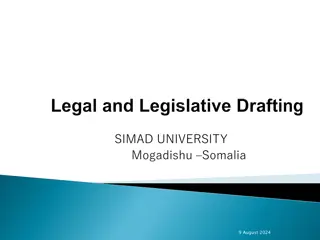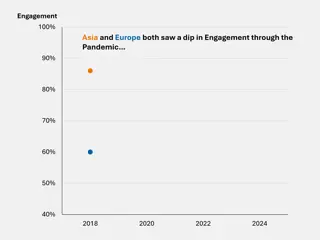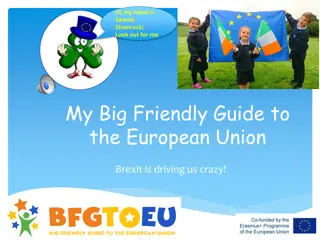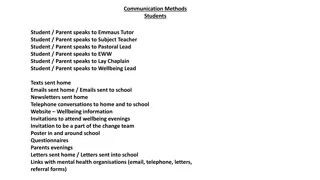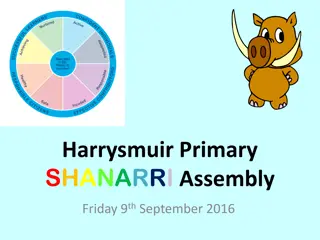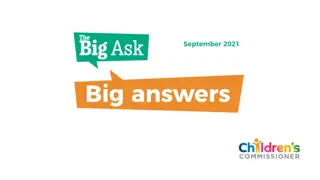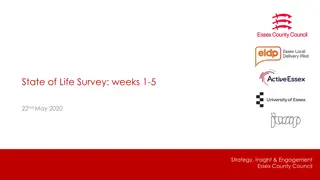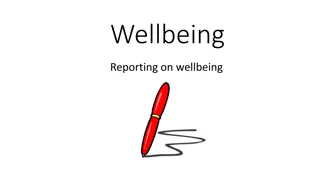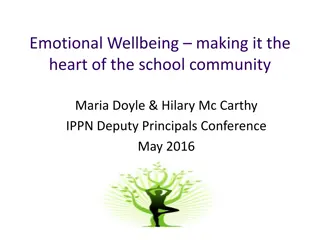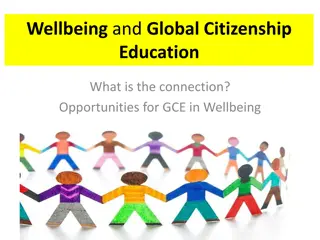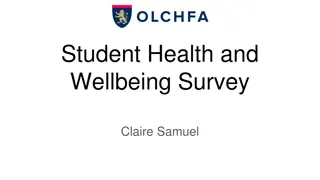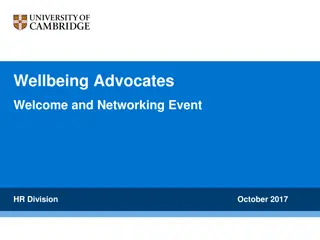Insights from Children's Parliament Wellbeing Survey Amid the Pandemic
Children's Parliament in Scotland focuses on promoting children's human rights and participation. They conducted a wellbeing survey during the pandemic, highlighting concerns such as learning challenges, family dynamics, and online safety. The survey also captured children's feelings about school work, online activities, family relationships, and peer support. The organization aims to raise awareness about children's rights and advocate for the implementation of the UNCRC across Scotland.
Download Presentation

Please find below an Image/Link to download the presentation.
The content on the website is provided AS IS for your information and personal use only. It may not be sold, licensed, or shared on other websites without obtaining consent from the author.If you encounter any issues during the download, it is possible that the publisher has removed the file from their server.
You are allowed to download the files provided on this website for personal or commercial use, subject to the condition that they are used lawfully. All files are the property of their respective owners.
The content on the website is provided AS IS for your information and personal use only. It may not be sold, licensed, or shared on other websites without obtaining consent from the author.
E N D
Presentation Transcript
Childrens Parliament is Scotlands Centre of Excellence for children s human rights and participation. Our dream is that children grow up in a world of love, happiness and understanding. Children s Parliament Our mission is to inspire greater awareness and understanding of the power of children s human rights and to support implementation of the United Nations Convention on the Rights of the Child (UNCRC) across Scotland. https://www.childrensparliament.org.uk/
1. How are you doing? wellbeing survey 2. The Corona Times Journal (quotes used in this presentation) Reporting on How are you doing? wellbeing survey and the Corona Times Journal is here bit.ly/Coronavirus_Kids Children and Coronavirus: Programme of work 3. The online resource Back to School: a rights based approach to recovery https://backtoschool.scot/ 4. Currently engaging in work with Parents and under 7s: Interviews with 15 families and children. Reporting late October Children s Parliament acknowledges support from the Scottish Government and Public Health Scotland.
How are you doing? wellbeing survey (April, May and June 2020) The survey is made up of 31 statements with a 5-point scale to respond from strongly agree to strongly disagree. There are final questions where children can identify what they are worried about and what helps them feel good. Number of children taking part Age SEX 70% 65% 63% 60% 56% 60% 52% 52% 52% 2810 50% 45% 44% 44% 50% 44% 4000 40% 36% 40% 34% 30% 30% 20% 20% 10% 4% 4% 3% 10% 3698 0% 0% % of respondents BOYS % of respondents GIRLS % of respondents who did April May June not respond or indicated prefer not to say or other % 8 to 11 years old % 12 to 14 years old April May June April May June
Learning at Home As lockdown progressed: there was a decline in the numbers of children (42%) who felt they had a choice in what they were learning; this was particularly true for the 12 to 14 year olds responding there was increased levels of boredom (54%) there was a decline in children reporting they had fun things to do (72%) most children (82%) reported that they feel safe when they are online there were increased levels of worry about doing school work (43% ). I hate this way of learning now. There is nothing good about it. Songstress, age 14
Family and Friends Most children reported enjoying being with their family during lockdown (90%) - though the proportion reporting so declined over lockdown The good thing is that I see my Mummy a lot and we play lots of games The majority of children reported that they are safe at home. Although numbers are small (4%) said they were not. Beluga8, age 8 In June 27% of children reported that their parents/carers worry about having enough money for their family. I m feeling a bit overwhelmed now, I think families are feeling like that now and so are arguing more. Despite the loss of face-to-face connections most children (90%) reported being happy with the friends they have and reported feeling supported by friends. TechBoy 20, age 13
Health and Wellbeing Across lockdown children reported a decline in mental wellbeing; fewer generally feeling cheerful and in a good mood (59%) and a reduction in children reporting they had plenty of energy (70%). Children increasingly often felt lonely (28%). Before the Lockdown I was happier. Now I m more lonely, feeling down Beluga8, age 8 I don t want to go back to lockdown because then contact with my family will just be on the phone, and I don t like that because I can t see them. Across lockdown 73% of children reported that they agree/strongly agree that they get enough exercise. However, a significant number of children are reporting a sedentary lifestyle that may have longer term impacts. B Bagigns, age 12 27% of children in June reported having 5 or more worries
Looking across the April, May and June results, compared to other groups (younger girls age 8 to 11 and all boys) girls aged 12 to 14 are least likely: To report having fun things to do in their day, know there are things they are good at, or be proud of things they can do. To feel they have a choice in what they are learning. To feel cheerful or in a good mood. To feel free to express opinions or look for and get the information they need. To feel that even if things are difficult, they know they will be okay. To say they make healthy choices, to know who to speak to if they have a health concern, to say they have plenty of energy. To report enjoying spending time with their family, that their family gets along well together, that they have someone to talk to in their family if they have a worry or that they are happy with the friends they have. And compared to other groups, girls aged 12 to 14 are most likely: To feel bored. To feel lonely and to say that that there are a lot of things that they worry about in life and to worry about their own health. Our survey results emphasise the need to consider the impact of lockdown on 12 to 14 year old girls.
Every childs experience has been different..
Involve children and young people in decision making Independent Children s Rights Impact Assessment For society to respect the views of children and young people, it needs to change how it sees and treats them. Children aren t passive objects in need of adult protection they are rights- holders that should be active participants in the decision-making processes that affect them. By allowing children s participation in this way, decisions can be made that are better, more relevant and more informed.
The final How are you doing? September survey results will be on our website by the end of October: https://www.childrensparliament.org.uk/ THANKS Contact: Rona@childrensparliament.org.uk


